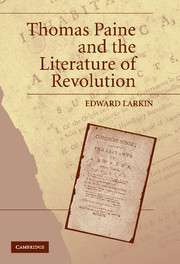Book contents
- Frontmatter
- Contents
- Acknowledgments
- Introduction
- 1 Inventing an American Public: The Pennsylvania Magazine and Revolutionary American Political Discourse
- 2 “Could the Wolf Bleat Like the Lamb”: Paine's Critique of the Early American Public Sphere
- 3 Writing Revolutionary History
- 4 The Science of Revolution: Technological Metaphors and Scientific Methodology in Rights of Man and The Age of Reason
- 5 “Strong Friends and Violent Enemies”: The Historical Construction of Thomas Paine through the Nineteenth Century
- Epilogue: Paine and Nineteenth-Century American Literary History
- Works Cited
- Index
1 - Inventing an American Public: The Pennsylvania Magazine and Revolutionary American Political Discourse
Published online by Cambridge University Press: 25 July 2009
- Frontmatter
- Contents
- Acknowledgments
- Introduction
- 1 Inventing an American Public: The Pennsylvania Magazine and Revolutionary American Political Discourse
- 2 “Could the Wolf Bleat Like the Lamb”: Paine's Critique of the Early American Public Sphere
- 3 Writing Revolutionary History
- 4 The Science of Revolution: Technological Metaphors and Scientific Methodology in Rights of Man and The Age of Reason
- 5 “Strong Friends and Violent Enemies”: The Historical Construction of Thomas Paine through the Nineteenth Century
- Epilogue: Paine and Nineteenth-Century American Literary History
- Works Cited
- Index
Summary
The July 1775 issue of the Pennsylvania Magazine, edited by Thomas Paine, opens with an essay, “Observations on the Military Character of Ants,” that purportedly investigates a new aspect of the nature of ants. The author, who writes under the pseudonym Curioso, observes that generally ants are cited only for their “industry and economy,” but that “we have neglected to consider them as patriots jealous of their natural rights, and as champions in the defence of them” (295). He then relates his observations of the interactions between a colony of red ants and one of brown ants that inhabit his yard. The reds are portrayed as seeking to deprive the browns of their natural rights thereby forcing the browns to war,
A war which the browns were driven into by the overbearing insolence of the reds, and obliged to undertake for the protection of their settlement. Had they passively submitted, they might have again been treated in the same manner [deprived of their property], and have wearied out their lives in building cities for others to take from them.
(299–300)The red ants are clearly identified with the British redcoats in this article, which uses the author's observations about ants as an occasion to justify the American colonies' right to raise an army to defend their property.
- Type
- Chapter
- Information
- Thomas Paine and the Literature of Revolution , pp. 22 - 48Publisher: Cambridge University PressPrint publication year: 2005



